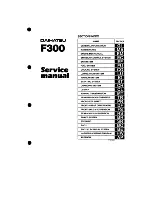
The low tire pressure warning light may come on in
cool weather when the vehicle is first started, and then
turn off as you start to drive. This could be an early
indicator that the air pressure in the tire(s) are getting
low and need to be inflated to the proper pressure.
A Tire and Loading Information label, attached to
your vehicle, shows the size of your vehicle’s original
equipment tires and the correct inflation pressure
for your vehicle’s tires when they are cold. See Loading
the Vehicle on page 4-30, for an example of the Tire
and Loading Information label and its location on
your vehicle. Also see Inflation - Tire Pressure
on page 5-56.
Your vehicle’s TPMS can warn you about a low tire
pressure condition but it does not replace normal
tire maintenance. See Tire Inspection and Rotation
on page 5-64 and Tires on page 5-48.
Notice: Liquid tire sealants could damage the Tire
Pressure Monitor System (TPMS) sensors. Sensor
damage caused by using a tire sealant is not
covered by your warranty. Do not use liquid tire
sealants.
TPMS Malfunction Light and Message
The TPMS will not function properly if one or more of
the TPMS sensors are missing or inoperable. When the
system detects a malfunction, the low tire warning light
flashes for about one minute and then stays on for the
remainder of the ignition cycle. A DIC warning message
is also displayed. The low tire warning light and DIC
warning message come on at each ignition cycle until the
problem is corrected. Some of the conditions that can
cause the malfunction light and DIC message to come
on are:
•
One of the road tires has been replaced with the
spare tire. The spare tire does not have a TPMS
sensor. The TPMS malfunction light and DIC
message should go off once you re-install the
road tire containing the TPMS sensor.
•
The TPMS sensor matching process was started but
not completed or not completed successfully after
rotating the vehicle’s tires. The DIC message and
TPMS malfunction light should go off once the TPMS
sensor matching process is performed successfully.
See “TPMS Sensor Matching Process” later in this
section.
5-61
Summary of Contents for 2009 SRX
Page 6: ...NOTES vi...
Page 21: ...Put someone on it Get it up to speed Then stop the vehicle The rider does not stop 1 15...
Page 80: ...NOTES 1 74...
Page 138: ...NOTES 2 58...
Page 141: ...NOTES 3 3...
Page 142: ...Instrument Panel Overview 3 4...
Page 280: ...NOTES 4 50...
Page 294: ...When you open the hood on the 4 6L V8 engine you will see the following 5 14...
Page 406: ...Engine Drive Belt Routing 3 6L V6 Engine 4 6L V8 Engine 6 16...
















































